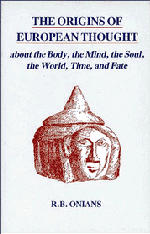Book contents
- Frontmatter
- Contents
- Preface to the first edition
- Preface to the second edition
- Introduction: The Earliest Greeks
- PART I THE MIND AND THE BODY
- PART II THE IMMORTAL SOUL AND THE BODY
- PART III FATE AND TIME
- Chapter I ‘On the Knees of the Gods’
- Chapter II Πείρατα
- Chapter III Καιρός
- Chapter IV The Weaving of Fate
- Chapter V Other Peoples—Fate and Magic
- Chapter VI Μοῖραν ἐπιτιθέναι, πεπρωμένος, etc.
- Chapter VII ʿΥπὲρ μόρον and the Relation of the Gods of Fate
- Chapter VIII The Jars of Zeus, the Scates of Zeus, and the Κῆρες
- Chapter IX Time—Ἦμαρ
- Chapter X Lachesis, Klotho, and Atropos
- Chapter XI Phases of Body and Mind, Sorrow, Sleep, Death, etc.
- Chapter XII Τέλος
- ADDENDA
- Indexes
Chapter VIII - The Jars of Zeus, the Scates of Zeus, and the Κῆρες
Published online by Cambridge University Press: 06 August 2010
- Frontmatter
- Contents
- Preface to the first edition
- Preface to the second edition
- Introduction: The Earliest Greeks
- PART I THE MIND AND THE BODY
- PART II THE IMMORTAL SOUL AND THE BODY
- PART III FATE AND TIME
- Chapter I ‘On the Knees of the Gods’
- Chapter II Πείρατα
- Chapter III Καιρός
- Chapter IV The Weaving of Fate
- Chapter V Other Peoples—Fate and Magic
- Chapter VI Μοῖραν ἐπιτιθέναι, πεπρωμένος, etc.
- Chapter VII ʿΥπὲρ μόρον and the Relation of the Gods of Fate
- Chapter VIII The Jars of Zeus, the Scates of Zeus, and the Κῆρες
- Chapter IX Time—Ἦμαρ
- Chapter X Lachesis, Klotho, and Atropos
- Chapter XI Phases of Body and Mind, Sorrow, Sleep, Death, etc.
- Chapter XII Τέλος
- ADDENDA
- Indexes
Summary
If the single image thus explains these many expressions, there yet remains a passage, describing the assignment of fate, which is universally treated as standing alone and explained without reference to any part of the conception detailed. It is the account of the πίθοι of Zeus whence he gives ‘gifts’, fortunes good and evil, to mortals. The context has passed unnoticed.
ὣς γὰρ ἐπεκλώσαντο θεοὶ δειλοĩσι βροτοĩσι
зώειν ἀχνυμένοις᾽ αὐτοὶ δέ τʾ ἀκηδέες εἰσί.
δοιοὶ γάρ τε πίθοι κατακείαται ἐν Διὸς οὔδει
δώρων οἶα δίδωσι, κακῶν, ἕτερος δὲ ἑάων.
ᾦ μέν κʾ ἀμμίξας δώῇ Ζεὺς τερπικέραυνος
ἄλλοτε μέν τε κακῷ ὅ γε κύρεται, ἄλλοτε δʾ ἐσθλῷ…
ῶς μὲν καὶ Πηλῆï θεοὶ δόσαν ἀγλαὰ δῶρα
ἐκ γενετῆς᾽ πάντας γὰρ ἐπ῞ ἀνθρώπους ἐκέκαστο…
ἀλλʾ ἐπὶ καὶ τῷ θῆκε θεὸς κακόν, ὅττι οἱ οὄ τι
παίδων ἐν μεγάροισι γονὴ γένετο κρειόντων.
The reflection begins explicitly with the conception of human fortunes as threads spun by the gods, and the manner of the giving is defined by an-expression (ἐπὶ τῷ θῆκε) which, as we have already seen, refers to the placing of the thread spun (μοĩρα or πεĩραρ) upon the individual. Elsewhere the gods are sometimes replaced by the personified Fates whose mode of creating human fortunes was, unquestionably, spinning, usually at birth, e.g.
πείσεται ἃσσα οἱ Αἷσα κατὰ Κλῶθές τε βαρεĩαι
γεινομένῳ νήσαντο λίνῳ ὅτε μιν τέκε μήτηρ.
- Type
- Chapter
- Information
- The Origins of European ThoughtAbout the Body, the Mind, the Soul, the World, Time and Fate, pp. 395 - 410Publisher: Cambridge University PressPrint publication year: 1988



